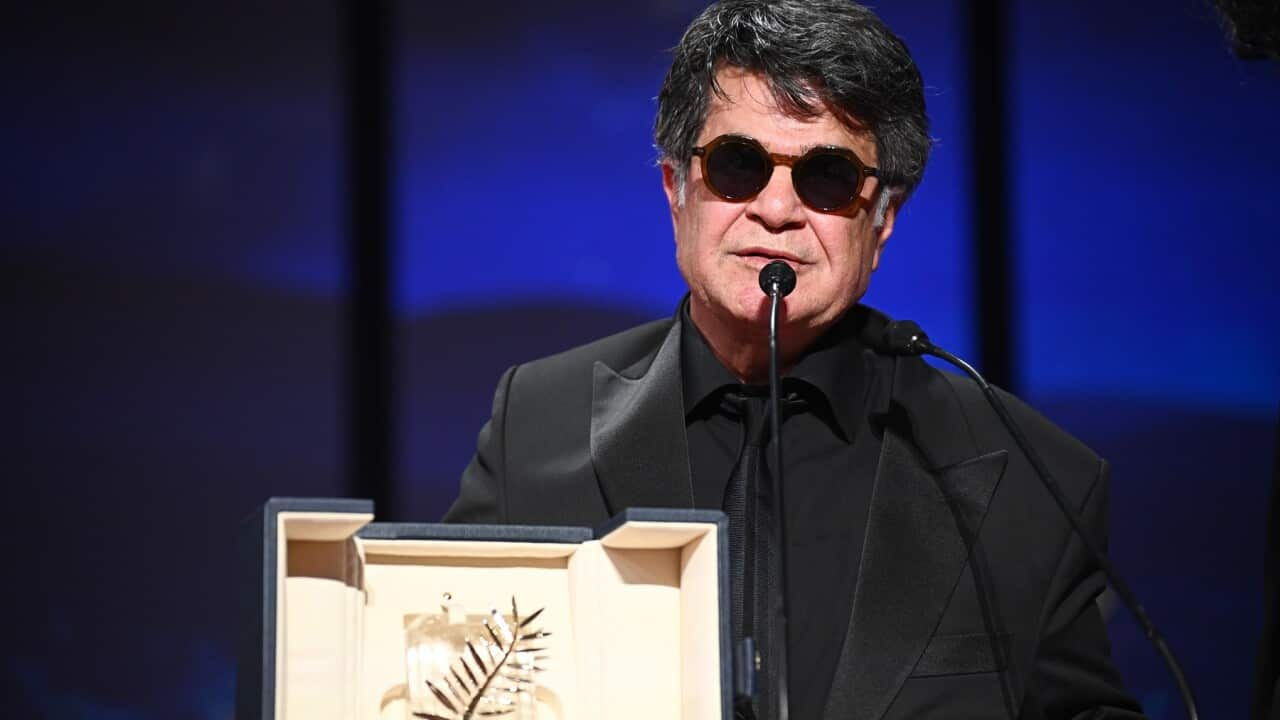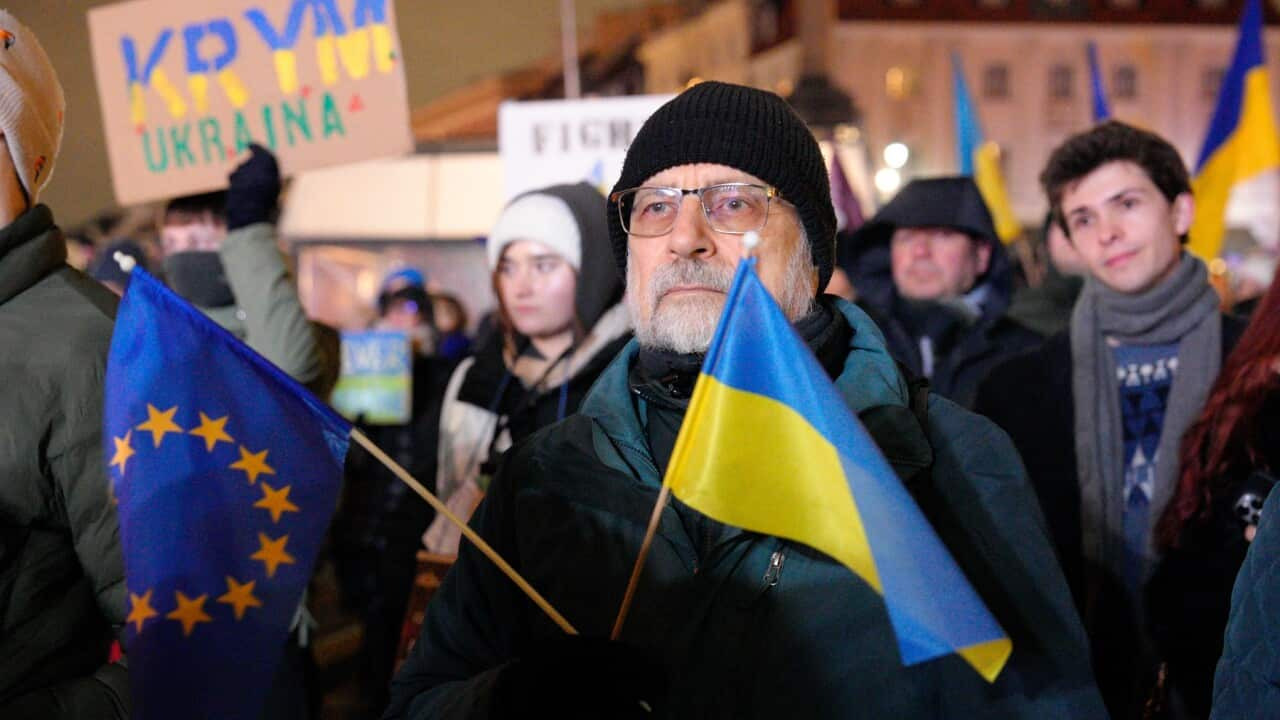Listen to Australian and world news, and follow trending topics with SBS News Podcasts.
TRANSCRIPT
At this year’s Cannes Film Festival, it was a night of power, both cinematic and literal.
The 78th edition ended with a surprise power outage and a powerful win.
Iranian director Jafar Panahi’s 'It Was Just An Accident' claimed the Palme d’Or, making him one of the few directors in history to win top prizes at all three major European festivals.
Mr Panahi, who has been arrested several times for his filmmaking, was last at the festival in person in 2003.
'It Was Just An Accident' follows Vahid, played by Vahid Mobasseri, who kidnaps a man with a false leg who looks just like the one who tortured him in prison and ruined his life.
Panahi says his time in jail influenced the film, but he himself did not experience all the stories recounted in it.
Clearly emotional, he dedicated the award to the people of Iran.
“Let’s just set aside all our differences and problems. What’s most important now is our country, and its freedom. Let us join forces, so no one can dare tell us what kind of clothes we can wear, what we must do, what we must not do. ... Cinema is a society. Nobody is entitled to tell us what we should do or refrain from doing.”
Speaking to reporters after the ceremony, he reflected on the film’s journey and the power of cinema in a divided nation.
"The entire team who worked with me poured their hearts into this. They were united. Just as I mentioned during the prize acceptance, I hope all these (political) groups come together and unite, responding to my humble request.. Don’t be afraid of challenges. Each society faces its own issues, but you can find solutions and make your own film.”
'It Was Just An Accident' is only the second Iranian film to win the top prize at Cannes, following Abbas Kiarostami’s 'Taste of Cherry' in 1997.
Jury President Juliette Binoche praised the work as she announced Mr Panahi's win.
“Art sparks the creative energy, from the most precious, most vibrant part of ourselves. A force that transforms darkness into mercy, hope, and new life. This is why we chose for the Palme d’Or “It Was Just An Accident” by Jafar Panahi.”
The Grand Prix, the festival’s second-highest honour, went to Norwegian director Joachim Trier for 'Sentimental Value'.
Mr Trier, a third-generation filmmaker, says he has had a lifelong passion for film, starting with a film camera in childhood.
“I grew up with the film camera in my hand. I filmed since I was a child. I'm a third generation filmmaker, my grandparents, my parents. You know, it's intuitive. It wasn't really a choice. It was more like, I'm really relieved that I was able to be allowed to continue doing it and make a living off of it as a grown up. So no, I try to stay with the core Eskil and I talk a lot about not losing the childish playfulness when we write."
Mr Trier later joked to reporters that his team was relieved not to have “fallen on our ass” after their last Cannes hit, “The Worst Person in the World.”
One of the night’s most joyous moments came when Brazilian director Kleber Mendonca Filho received two awards for 'The Secret Agent': Best Director for himself, and Best Actor for Wagner Moura, who accepted remotely, mid-meal, via video call.
"I so wish I was there with all of you, but I'm here by myself having a glass of wine in London alone. I couldn't be happier. This was such an important moment of my life just to work and collaborate and be with him. I've been trying to work with Kleber for many years and I'm very, very happy for the way that the film has been received because this is the first year of the film and it means a lot to the Brazilian culture and and I just it's a shame I'm celebrating all by myself. I wish I was there with all of you."
Mr Filho, grinning at the press conference, told reporters he was already celebrating backstage when he found out he’d also won.
"To my surprise, because I was already backstage having a glass of champagne, which was offered to me, I saw that something was happening on the monitor and I had to run back to receive the Best Director award. This, of course, if you look at the list of past winners in the history of this festival, is a very significant award."
The Jury Prize was split between two intimate and reflective works, Mascha Schilinski’s 'Sound of Falling', which explores intergenerational trauma, and Oliver Laxe’s desert-set drama 'Sirat'.
Mr Laxe, who said he felt like a son of Cannes, told journalists the recognition gave him the freedom to dream even bigger for his next project.
“I'm happy too because this is, that means freedom for me, you know? I mean, to be legitimised with this means on the next film I will jump even from higher. I'm proud of the attitude we had making this film. We didn't calculate, we didn't, we didn't calculate the consequences, you know? We were doing this film like if it was the last time, the last film. And I think we can feel this in 'Sirat', you know, we can see this, this call of adventure."
Elsewhere, Best Actress went to newcomer Nadia Melliti for 'The Little Sister', a queer coming-of-age story.
Ms Melliti, says she hopes her film will bridge divides.
"I hope they (audiences) will understand we aren't all simple, that each individual has their complexities and their singularity. It is important to understand the other and be tolerant towards people around us and be kind."
Belgium’s Dardenne brothers, already two-time Palme d’Or winners, took home Best Screenplay for 'Young Mothers'.
China’s Bi Gan won the Special Prize for 'Resurrection', while Iraq’s Hasan Hadi made history with 'The President’s Cake', becoming the first Iraqi director to win the Camera d’Or.
“This award doesn’t only recognise doesn’t only recognise this film but also, it recognises that it’s a story from my nation, from Iraq, a story that was born in the Mesopotamian marshes and travelled all the way to here. Today, thanks to you, we are making history, by receiving this, the first award to be ever given to an Iraqi film at Cannes film festival.”
But amid the glamour, the festival almost didn’t end on such a high note.
A power outage hit parts of Cannes on Saturday, disrupting restaurants and events.
Isabelle Leroy, who runs a brasserie near the Palais, said the blackout was devastating for local businesses.
“It has been catastrophic, it was very troubling and we weren’t able to accept all the customers, there you go, that’s it. So we weren’t able to make hot dishes, the customers weren’t able to drink what they wanted to drink, they weren’t able to drink beer, they weren’t able to, there you go, it was really, very, very complicated.”













